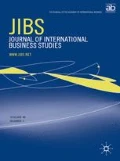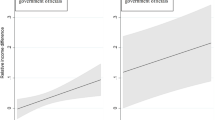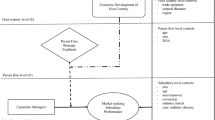Abstract
This study examines the interactive effects of host-country societal trust and formal institutions on foreign subsidiary staffing strategies. Based on the conceptualization of institutions in new institutional economics, we demonstrate that high societal trust and strong formal institutions that support market-based exchange jointly reduce the incidence of expatriate staffing in foreign subsidiaries. We identify two contingency factors – subsidiary interdependence and host-country experience – that affect this relationship. Our finding suggests that the level of interdependence among subsidiaries within the MNE network and the host-country experience of the subsidiaries negatively moderate the interactive effect of formal and informal institutions on expatriate staffing. We test our hypotheses based on longitudinal data of 6675 foreign subsidiaries of 435 Korean MNEs in 42 countries between 1990 and 2014.
Résumé
Cette recherche examine les impacts interactifs de la confiance au sein de la société et des institutions formelles du pays d’accueil sur les stratégies de dotation en personnel liées aux filiales étrangères. Nous appuyant sur la conceptualisation des institutions dans la perspective de la nouvelle économie institutionnelle, nous démontrons qu'une confiance sociétale élevée et les institutions formelles fortes qui soutiennent les échanges basés sur le marché réduisent conjointement l’ampleur du recours aux expatriés dans les filiales étrangères. Nous identifions deux facteurs de contingence – l'interdépendance entre les filiales et l'expérience dans le pays d'accueil – lesquels influent sur cette relation. Nos résultats suggèrent que le niveau d'interdépendance entre les filiales au sein du réseau d’une entreprise multinationale et l'expérience des filiales dans le pays d'accueil modèrent négativement l'impact interactif des institutions formelles et informelles sur l’effectif des expatriés. Nous testons nos hypothèses sur une base de données longitudinales de 6675 filiales étrangères de 435 multinationales coréennes dans 42 pays pour la période 1990–2014.
Resumen
Este estudio examina los efectos interactivos de la confianza en la sociedad del país anfitrión y las instituciones formales sobre las estrategias de contratación de personal de las filiales extranjeras. Con base en la conceptualización de la nueva economía institucional, demostramos que una alta confianza social e instituciones formales fuertes que apoyan el intercambio basado en el mercado conjuntamente reducen la incidencia de la contratación personal expatriado en las filiales extranjeras. Identificamos dos factores de contingencia -la interdependencia de las filiales y la experiencia del país anfitrión- que afectan esta relación. Nuestros hallazgos sugieren que el nivel de interdependencia y la experiencia entre las filiales dentro de la red de la empresa multinacional y la experiencia del país anfitrión en las filiales modera negativamente el efecto interactivo de las instituciones formales e informales en la contratación de personal expatriado. Probamos nuestras hipótesis basándonos en datos longitudinales de 6.675 filiales extranjeras de 435 multinacionales coreanas en 42 países entre 1990 y 2014.
Resumo
Este estudo examina os efeitos interativos da confiança social do país anfitrião e instituições formais nas estratégias de alocação de funcionários em subsidiárias estrangeiras. Com base na conceituação de instituições na nova economia institucional, demonstramos que alta confiança da sociedade e fortes instituições formais que apoiam mudanças baseadas no mercado reduzem, em conjunto, a incidência de alocação de expatriados em subsidiárias estrangeiras. Identificamos dois fatores de contingência - interdependência da subsidiária e experiência do país anfitrião - que afetam essa relação. Nossas descobertas sugerem que o nível de interdependência entre subsidiárias dentro da rede da MNE e a experiência do país anfitrião das subsidiárias moderam negativamente o efeito interativo de instituições formais e informais sobre a alocação de expatriados. Testamos nossas hipóteses com base em dados longitudinais de 6.675 subsidiárias estrangeiras de 435 MNEs coreanas em 42 países entre 1990 e 2014.
摘要
本研究考察了东道国社会信任和正规制度对外国子公司人员配备战略的互动影响。基于新制度经济学中制度的概念化, 我们证明了高度的社会信任和支持市场交换的强大正式制度共同降低了外国子公司外派人员的发生率。我们确定了影响这种关系的两个偶然因素——子公司的相互依赖和东道国的经验。我们的研究结果表明, 跨国企业(MNE) 网络内子公司之间的相互依赖程度和子公司的东道国经验消极地缓和了正式和非正式制度对外派人员配备的互动影响。我们根据 1990 至 2014 年间 42 个国家的 435 家韩国跨国公司的 6,675 家外国子公司的纵向数据检验了我们的假设。




Similar content being viewed by others
REFERENCES
Ambos, B., Kunisch, S., Leicht-Deobald, U., & Steinberg, A. S. 2019. Unravelling agency relations inside the MNC: The roles of socialization, goal conflicts and second principals in headquarters–subsidiary relationships. Journal of World Business, 54(2): 67–81.
Arrow, K. J. 1972. Gifts and exchanges. Philosophy and Public Affairs, 1(4): 343–367.
Belderbos, R. A., & Heijltjes, M. G. 2005. The determinants of expatriate staffing by Japanese multinationals in Asia: Control, learning and vertical business groups. Journal of International Business Studies, 36(3): 341–354.
Boix, C., & Posner, D. N. 1998. Social capital: Explaining its origins and effects on government performance. British Journal of Political Science, 28(4): 686–693.
Boyacigiller, N. 1990. The role of expatriates in the management of interdependence complexity and risk in multinational corporations. Journal of International Business Studies, 21(3): 357–381.
Brockman, P., El Ghoul, S., Guedhami, O., & Zheng, Y. 2020. Does social trust affect international contracting? Evidence from foreign bond covenants. Journal of International Business Studies. https://doi.org/10.1057/s41267-020-00348-4.
Buckley, P. J., Chen, L., Clegg, L. J., & Voss, H. 2020. The role of endogenous and exogenous risk in FDI entry choices. Journal of World Business, 55(1): 101040.
Chami, R., & Fullenkamp, C. 2002. Trust as a means of improving corporate governance and efficiency. IMF Working Papers, 02(33): 1.
Child, J., & Mollering, G. 2003. Contextual confidence and active trust development in the Chinese business environment. Organization Science, 14: 69–80.
Cline, B. N., & Williamson, C. R. 2016. Trust and the regulation of corporate self-dealing. Journal of Corporate Finance, 41: 572–590.
Colakoglu, S., & Caliguiri, P. 2008. Cultural distance, expatriate staffing and subsidiary performance: The case of US subsidiaries of multinational corporations. International Journal of Human Resource Management, 19(2): 223–239.
Coleman, J. S. 1988. Social capital in the creation of human capital. American Journal of Sociology, 94: S95–S120.
Cook, K. 2003. Trust in society. New York: Sage.
Dau, L. A. 2017. Contextualizing international learning: The moderating effects of mode of entry and subsidiary networks on the relationship between reforms and profitability. Journal of World Business, 53(3): 403–414.
Dau, L. A., Moore, E. M., & Kostova, T. 2020. The impact of market based institutional reforms on firm strategy and performance: Review and extension. Journal of World Business, 55(4): 101073.
Fiori, S. 2018. Formal and informal norms: Their relationships in society and in the economic sphere. Review of Social Economy, 76(2): 198–226.
Fukuyama, F. 1995. Trust: The social virtues and the creation of prosperity. New York: The Free Press.
Gaur, A. S., Delios, A., & Singh, K. 2007. Institutional environments, staffing strategies, and subsidiary performance. Journal of Management, 33(4): 611–636.
Gaur, A. S., & Lu, J. 2007. Ownership strategies and subsidiary performance: Impacts of institutions and experience. Journal of Management, 33(1): 84–110.
Ghoshal, S., & Bartlett, C. A. 1990. The multinational corporation as an interorganizational network. The Academy of Management Review, 15(4): 603–625.
Gong, Y. 2003. Subsidiary staffing in multinational enterprises: Agency, resources, and performance. Academy of Management Journal, 46(6): 728–739.
Hagen, J. M., & Choe, S. 1998. Trust in Japanese interfirm relations: Institutional sanctions matter. Academy of Management Review, 23(3): 589–600.
Helmke, G., & Levitsky, S. 2004. Informal institutions and comparative politics: A research agenda. Perspectives on Politics, 2(4): 725–740.
Heritage Foundation. 2018. The Heritage Foundation Website for Index of Economic Freedom from https://www.heritage.org/index/about.
Hodgson, G. M. 2006. What are institutions? Journal of Economic Issues, 40(1): 1–25.
Holmes, R. M., Jr., Miller, T., Hitt, M. A., & Salmador, M. P. 2013. The interrelationships among informal institutions, formal institutions, and inward foreign direct investment. Journal of Management, 39(2): 531–566.
Ingram, P., & Silverman, B. S. 2002. The new institutionalism in strategic management. In P. Ingram, & B. S. Silverman (Eds.), Advances in strategic management: 1–30, vol. 19. New York: JAI Press.
Knack, S., & Keefer, P. 1997. Does social capital have an economic payoff? A cross-country investigation. The Quarterly Journal of Economics, 112(4): 1251–1288.
Kostova, T., Nell, P. C., & Hoenen, A. K. 2016. Understanding agency problems in headquarters-subsidiary relationships in multinational corporations: A contextualized model. Journal of Management.. https://doi.org/10.1177/0149206316648383.
La Porta, R., Lopez-de-Silanes, F., Shleifer, A., & Vishny, R. W. 1997. Trust in large organizations. American Economic Review, 87(2): 333–338.
Lazzarini, S. G., Miller, G. J., & Zenger, T. R. 2001. Order with a little bit of law: Complementarity vs. substitution between formal and informal arrangements. Working paper, Olin School of Business, Washington University.
Levitsky, S., & Murillo, V. 2009. Variation in institutional strength: Causes and implications. Annual Review of Political Science, 12: 115–133.
Liu, Y., & Meyer, K. 2020. Boundary spanners, HRM practices, and reverse knowledge transfer: The case of Chinese cross-border acquisitions. Journal of World Business, 55(2): 100958.
Makhija, M. V., Kim, K., & Williamson, S. D. 1997. Measuring globalization of industries using a national industry approach: Empirical evidence across five countries and over time. Journal of International Business Studies, 28(4): 679–710.
McAllister, D. J. 1995. Affect- and cognition-based trust as foundations for interpersonal cooperation in organizations. Academy of Management Journal, 38: 24–59.
Nannestad, P. 2008. What have we learned about generalized trust, if anything? Annual Review of Political Science, 11: 413–436.
Nee, V. 1998. Norms and networks in economic and organizational performance. American Economic Review, 88(2): 85–89.
North, D. C. 1990. Institutions, institutional change and economic performance. Cambridge: Cambridge University Press.
North, D. C. 1991. Institutions. Journal of Economic Perspectives, 5: 97–112.
O’Donnell, S. W. 2000. Managing foreign subsidiaries: Agents of headquarters, or an interdependent network? Strategic Management Journal, 21(5): 525–548.
Oliver, C. 1991. Strategic responses to institutional processes. Academy of Management Review, 18(1): 145–179.
Outila, V., Mihailova, I., Reiche, B. S., & Piekkari, R. 2020. A communicative perspective on the trust-control link in Russia. Journal of World Business, 55(6): 100971.
Pejovich, S. 1999. The effects of the interaction of formal and informal institutions on social stability and economic development. Journal of Markets & Morality, 2(2): 164–181.
Peng, M. W. 2003. Institutional transitions and strategic choices. Academy of Management Review, 28(2): 275–296.
Pevzner, M., Xie, F., & Xin, X. 2015. When firms talk, do investors listen? The role of trust in stock market reactions to corporate earnings announcements. Journal of Financial Economics, 117(1): 190–223.
Poppo, L., & Zenger, T. 2002. Do formal contracts and relational governance function as substitutes or complements? Strategic Management Journal, 23(8): 707–725.
Provan, K. G. 1993. Embeddedness, interdependence, and opportunism in organizational supplier-buyer networks. Journal of Management, 19(4): 841–856.
Putnam, R. 2001. Social capital: Measurement and consequences. Canadian Journal of Policy Research, 2(1): 41–51.
Putnam, R. D. 1993. Making democracy work: Civic traditions in modern Italy. Princeton: Princeton University Press.
Seyoum, B. 2011. Informal institutions and foreign direct investment. Journal of Economic Issues, 45(4): 917–940.
Singh, D., & Gaur, A. S. 2021. Risk mitigation in international B2B relationships: Role of institutions and governance. Journal of Business Research, 136: 1–9.
Singh, D., Pattnaik, C., Lee, J. Y., & Gaur, A. S. 2019. Subsidiary staffing, cultural friction, and subsidiary performance: Evidence from Korean subsidiaries in 63 countries. Human Resource Management, 58(2): 219–234.
Sønderskov, K. M., & Dinesen, P. T. 2016. Trusting the State, trusting each other? The effect of institutional trust on social trust. Political Behavior, 38: 179–202.
Tan, D., & Mahoney, J. T. 2006. Why a multinational firm chooses expatriates: Integrating resource-based, agency and transaction costs perspectives. Journal of Management Studies, 43(3): 457–484.
Uslaner, E. M. 2002. The moral foundations of trust. Cambridge: Cambridge University Press.
Williamson, C. R. 2009. Informal institutions rule: Institutional arrangements and economic performance. Public Choice, 139(3–4): 371–387.
Williamson, O. E. 2000. The new institutional economics: Taking stock, looking ahead. Journal of Economic Literature, 38(3): 595–613.
World Values Survey. 2018. The world values survey: Who we are. http://www.worldvaluessurvey.org/WVSContents.jsp. Accessed 7 June 2018.
Zaheer, S. 2002. The liability of foreignness, redux: A commentary. Journal of International Management, 8(3): 351–358.
Zaheer, Z., & Zaheer, A. 2006. Trust across borders. Journal of International Business Studies, 37(1): 21–29.
Zenger, T. R., Lazzarini, S. G., & Poppo, L. 2002. Informal and formal organization in new institutional economics. In P. Ingram, & B. S. Silverman (Eds.), The new institutionalism in strategic management: 275–303. Amsterdam: Elsevier.
Zhang, C. 2020. Formal and informal institutional legacies and inward foreign direct investment into firms: Evidence from China. Journal of International Business Studies.. https://doi.org/10.1057/s41267-020-00359-1.
Zhou, A. J., Fey, C., & Yildiz, H. E. 2020. Fostering integration through HRM practices: An empirical examination of absorptive capacity and knowledge transfer in cross-border M&As. Journal of World Business, 55(2): 100947.
Zucker, L. G. 1986. Production of trust: Institutional sources of economic structure, 1840 to 1920. In L. L. Cummings, & B. M. Staw (Eds.), Research in organizational behavior: 55–111. Greenwich, CT: JAI Press.
Author information
Authors and Affiliations
Corresponding author
Additional information
Publisher's Note
Springer Nature remains neutral with regard to jurisdictional claims in published maps and institutional affiliations.
Accepted by Luis Dau, Guest Editor, 7 November 2021. This article has been with the authors for five revisions.
Rights and permissions
About this article
Cite this article
Gaur, A., Pattnaik, C., Singh, D. et al. Societal trust, formal institutions, and foreign subsidiary staffing. J Int Bus Stud 53, 1045–1061 (2022). https://doi.org/10.1057/s41267-021-00498-z
Received:
Revised:
Accepted:
Published:
Issue Date:
DOI: https://doi.org/10.1057/s41267-021-00498-z




